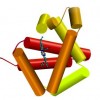Your Genes, Your Health

Genetic Disorders Go B/Hollywood
Dec 1st
Remember Brad Pitt as Benjamin Button? Benjamin’s disorder, that had him being born looking like an 80-year-old man and “reverse aging” to pass away as a baby? Well, while I still am not aware of a real disorder that causes this kind of a phenomenon, there is a disorder that indeed makes people age much faster than normal: Hutchinson-Gilford Progeria Syndrome (Progeria for short), which is about to be depicted in a movie of its own.
Progeria is a very rare, genetic disorder that afflicts roughly one in 5 million people. It is caused by a mutation in the LaminA gene More >

How can I prolong health? Hmmm…..
Nov 6th
Having an edge on the stock market can allow one to make hundreds, thousands or even millions of dollars. But rarely do we think of having an edge on life. Since the sequencing of the human genome our understanding of human genes and their interaction has grown. Geneticists now have the capability to analyze genetic make-ups, and elucidate what genetic patterns will evolve into certain conditions or disease states.
Any individual has a unique genetic profile different from that of another person. Contained within these differences are unique genetic variations that may make a person more susceptible to diseases such as More >

Trembling Hands and … Genes?
Oct 23rd
Fragile X Tremor/Ataxia Syndrome (FXTAS) is among the most prevalent heritable neurodegenerative disorders. Its symptoms usually develop in men 50 years of age or older and include tremors in arms and hands, balance problems (ataxia), numbness in the extremities, mood instability, short-term memory loss, and gradual intellectual decline. The prevalence of FXTAS is about 2-5 persons per 10,000 in the general population.
The underlying cause for FXTAS is a mutation in the gene for Fragile X Mental Retardation Protein (FMRP), which is located on the X-chromosome; its protein product, Pur-α is essential for normal neural function. Scientists have recently determined the three-dimensional structure More >

The fight against Huntington’s
Oct 9th
Huntington’s disease (HD) is an inherited disease, characterized by the wasting away of certain nerve cells in the brain. If a person inherits only one mutated copy of the Huntingtin gene they develop the disease. One who is born with the defective gene responsible for the disease may not show any of the symptoms until middle age. Symptoms could consist of balance issues, uncontrolled movements or clumsiness. In the progression of the disease one may also loose the capability to talk or even walk.
Medivation, Inc. and Pfizer Inc. have publicized that the start of phase three trials in the usage More >

Medicine or Poison? It’s in Your Genes, duh…
Sep 24th
As the ongoing deciphering of the human genome provides us with more and more insights about our predisposition for diseases and genetic disorders, (see Your Genes Your Health for examples) I am equally, if not more astounded by what it tells us about our ability to utilize medicines to counteract diseases.
Just recently, a group of researchers at the University of Maryland School of Medicine have identified a variant of a gene that is believed to play a major role in determining why people do not respond to a popular anti-clotting medication. This gene variant, carried by as many as a third More >

A Complication Of Sickle Cell
Sep 12th
This blog serves to provide information about a common complication of sickle cell disease known as pulminary hypertension. Puluminary hypertension is a disorder in which one has elevated pulminary artery pressure and pulminary vascular resistance. Pulminary hypertension turns out to be a rising risk factor for morbidity and mortality in adults with sickle cell disease. As in other chronic haemolytic disorders an echocardiograph is very helpful in elucidating pulminary hypertension. Any insight into the disposition of the patient can decrease the progression of the disease early on. Therapy for these patients may consist of vasodilators and or antiremodiling agents depending More >
